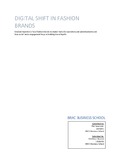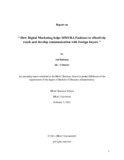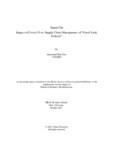| dc.contributor.advisor | Islam, Md Shamimul | |
| dc.contributor.author | Fahad, Shafayet Ullah | |
| dc.date.accessioned | 2024-06-04T08:33:49Z | |
| dc.date.available | 2024-06-04T08:33:49Z | |
| dc.date.copyright | ©2023 | |
| dc.date.issued | 2023-05 | |
| dc.identifier.other | ID 21364084 | |
| dc.identifier.uri | http://hdl.handle.net/10361/23116 | |
| dc.description | This internship report is submitted in partial fulfillment of the requirements for the degree of Bachelor of Business Administration, 2023. | en_US |
| dc.description | Cataloged from the PDF version of the internship report. | |
| dc.description | Includes bibliographical references (pages 23-24). | |
| dc.description.abstract | Sustainability has to be assimilated among the Bangladesh fashion brands and textile industry to achieve brand equity. Aarong is a Bangladeshi retail brand that has successfully merged cultural heritage and modern way of living for the consumers through handcrafted clothes, products, and home decorative accessories. From a small beginning in 1978, the brand has been able to strengthen its position as local market innovator by virtue of Sir Fazle Hasan Abed’s vision for branding and social growth. The brand has a strong impression on the cultural, social and economic transformation of Bangladesh. A survey was conducted to analyze brand awareness, performance, feelings and loyalty in regards to Aarong. Consumers expressed negative feelings towards perceived-quality, e-commerce shopping experience, brand association and sustainability initiatives. These factors refrain consumers from reaching brand resonance. Followed by a careful strategic analysis, it was observed that Aarong could formulate three approaches: chief branding officer (CBO) placement, fashion upcycling & user-experience (UX) innovation towards fashion sustainability and brand equity. The case persuades students and fashion brand management leaders to consider the implications of being a market innovator and to recommend brand equity to construct sustainable initiatives for fashion products and digital user-experience innovation. | en_US |
| dc.description.statementofresponsibility | Shafayet Ullah Fahad | |
| dc.format.extent | 41 pages | |
| dc.language.iso | en | en_US |
| dc.publisher | BRAC University | en_US |
| dc.rights | Brac University internship reports are protected by copyright. They may be viewed from this source for any purpose, but reproduction or distribution in any format is prohibited without written permission. | |
| dc.subject | Fashion upcycling | en_US |
| dc.subject | Brand equity | en_US |
| dc.subject | Aarong | en_US |
| dc.subject | Fashion e-commerce | en_US |
| dc.subject | Chief-branding officer | en_US |
| dc.subject | Sustainability | en_US |
| dc.subject.lcsh | Branding (Marketing) | |
| dc.subject.lcsh | Brand name products--Management | |
| dc.subject.lcsh | Electronic commerce | |
| dc.title | Sustainable fashion for Aarong: the impact of fashion upcycling, chief branding officer & fashion e-commerce experience on the Bangladeshi consumers’ brand equity | en_US |
| dc.type | Internship report | en_US |
| dc.contributor.department | Brac Business School, Brac University | |
| dc.description.degree | B. Business Administration | |




